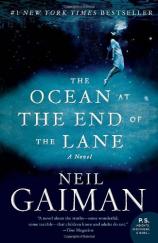The Ocean at the End of the Lane
Review
The Ocean at the End of the Lane
It has been some time since Neil Gaiman handed over a novel for adults. You'd have to go back to 2005 for ANANSI BOYS to find the last one. Since then, he's been busy with kids books, film adaptations and television. He says he escaped to Florida thinking to write a sequel to AMERICAN GODS. What came out of him instead was the beautiful, chilling and bittersweet THE OCEAN AT THE END OF THE LANE.
Our narrator is a grown man, making his way through a funeral on autopilot. Needing to get away from it all, he drives. He leads his car to his old haunts, driving past what was the spot where his old house once stood when he was seven, and bringing himself to stop at the end of the lane, where 11-year-old Lettie Hempstock lived with her mother and grandmother. And where Lettie showed him the small duck pond she insisted was an ocean.
"What Gaiman excels at, and where THE OCEAN AT THE END OF THE LANE truly succeeds, is in its honest examination of youth, and the very real scariness of being such a tiny soul in a world so vast that you cannot comprehend it."
There, on the shores of the water, our narrator begins to recall his youth, and the horrors and wonders that occurred when he was seven. Things he had long forgotten begin to rise to the surface and gaps start filling in his memory --- memories of loss, heartache, friendship, magic and fear.
THE OCEAN AT THE END OF THE LANE is a glorious work. Reading through it, you can find hints of AMERICAN GODS in the timelessness of the three Hempstock women, and you can see traces of CORALINE with the introduction of Ursula Monkton. Yet, while you can find those pieces woven into the fabric of the tale, Gaiman does what he always does: weaves magic and makes new what seems aged and familiar.
The narrator, unnamed through the entire novel, is the perfect connection for readers, drawing on the past and on childhood memories, recalling the fears of those tender young days, and touching that part of us that has felt those same fears. He is alone, without friends, but embraces books and reads voraciously, using some of what he reads to get him out of his scrapes. He has a mistrust of grownups, and in some cases they frighten him. All it takes is for Lettie Hempstock and a touch of magic to change his entire life, but not without walking a dark path in return.
The Hempstock women are solid, strong characters. At times they are humorous, while at others they turn a simple phrase that calls up a memory of long ago, which causes a smile. Lettie, in particular, is an adventurous 11-year-old, but very protective of our narrator. When she speaks, you believe her. When she tells you her pond is an ocean, you know she would not lie.
What Gaiman excels at, and where THE OCEAN AT THE END OF THE LANE truly succeeds, is in its honest examination of youth, and the very real scariness of being such a tiny soul in a world so vast that you cannot comprehend it. Yet, ultimately, being big doesn't give you all the answers, and many times you're still just as scared. All you can do is live, and strive each and every day to make it worthwhile.
Reviewed by Stephen Hubbard on June 21, 2013





